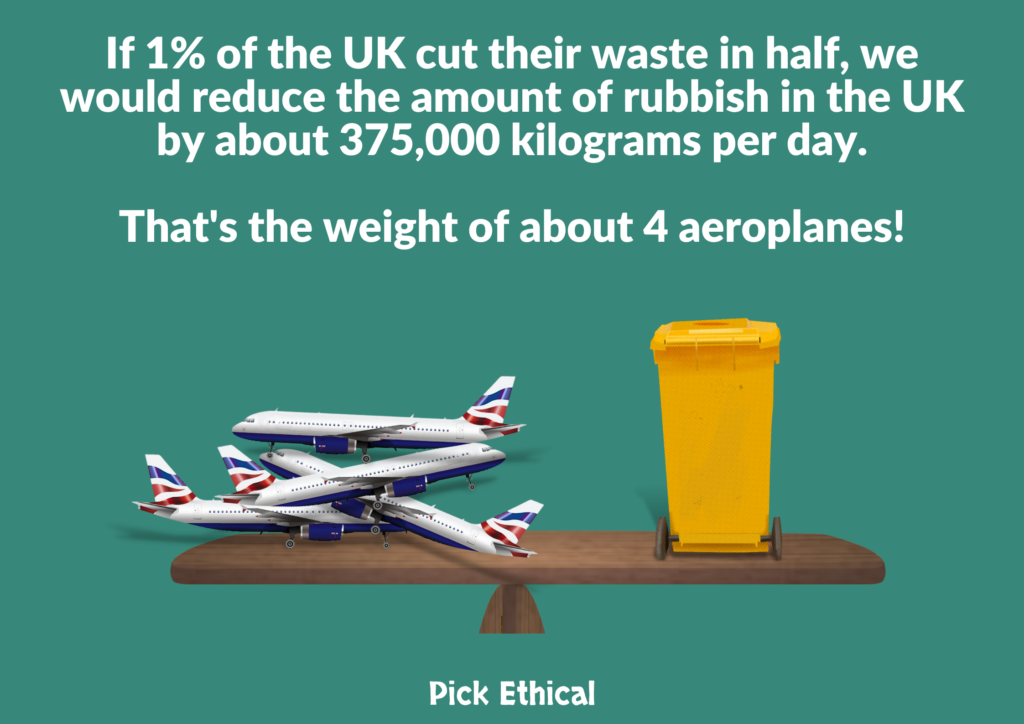When you think of zero waste, do you imagine a world where everything is recycled and nothing goes to landfill? Do you picture a future where there are no plastic straws or disposable coffee cups?
The ideal zero-waste world sounds wonderful, but is it really achievable in the real world? In this article, we’ll take a look at why some people believe that zero waste is practically impossible. We’ll also explore some of the reasons why zero waste isn’t possible.
How Do You Define Zero Waste?
You can define zero waste as conserving all products, packaging, materials and resources to ensure it is either reused, recycled or composted. Put simply: not putting it in the waste bin.
Being “zero waste” can mean different things to different people. Some believe it is about completely eliminate waste, while others contend that it means nearly eliminating waste.
But ultimately the zero waste movement follows the same principles, the 5 R’s:
- Refuse
- Reduce
- Reuse
- Recycle
- Rot
So, let’s answer the question at hand.
Is Living Completely Zero Waste Possible?
Currently, a zero waste society is impossible at the moment, and it’s unlikely to be achievable in the near future.
Why is Eliminating Waste So Difficult?
Achieving a zero waste society would require us to rethink the way we design, produce, maintain, and recycle all products, buildings, and cities.
Living a zero waste lifestyle is difficult and comes with challenges, which is why some people believe it is a pipe dream to think that absolute zero waste is possible.
We would need to re-think our entire way of life
As noted by a research paper, we would need to drastically change our consumption and waste-management of non-renewable resources, like oil for fuel, and certain metals and minerals used in technology and materials.
New legislation would also be needed to ensure that all newly created products, buildings and infrastructure is sustainable– which would come at a huge cost to the manufacturer, consumers, and tax payers.
Complex problem to solve
The waste reduction and management problem is extremely complex. It involves not just the reduction of municipal solid waste, but also chemicals, pesticides, and other pollutants.
On top of that, reducing waste is not always a top priority for governments, so the issues perhaps doesn’t get the attention it deserves.
Lack of Funding & Resources
Most nations do not have the resources needed to tackle the waste reduction problem, much less the funds necessary to achieve zero waste.
The waste reduction problem also requires a wide range of expertise, from scientists to engineers and others. There is a shortage of qualified personnel in most countries.
Many countries also lack the proper facilities needed to provide the waste management services needed for a circular economy.
However, Reducing Waste Solves Half Of The Problem!

On a positive note, simply finding ways to reduce our waste will solve half the problem of whether zero waste is possible.
On average, a person in the UK produces about 399kg of waste a year.
If just 1% of the UK decided to try cutting their waste in half, we would reduce the amount of rubbish in the UK by about 137,000,000 kilograms per year. Crikey.
That’s like reducing 4 aeroplanes worth of rubbish every day for a year.
Recycling Doesn’t Solve Everything
Many materials that we use day-today, such as toxic heavy metals and certain plastics, cannot be recycled. A lot of materials can be recycled, but only under special conditions in certain areas.
Recycling isn’t uniform, so 44% of people in the UK don’t know what they can and can’t recycle in their kerbside collection.
On top of that, many of our of our daily items are difficult to replace with recyclable, or ideally, compostable alternatives.
One of the biggest limitations of recycling is that it uses energy, albeit less energy that it takes to create new materials. Despite that, it means that the recycling process creates pollution in order to reuse a material.
Unless the recycling process is 100% clean and adopted by everybody, it does not solve the problem of waste being created.
Zooming In on the Real Problems
Let’s take a look at some of the real problems with our current waste habits.
Plastic pollution
The plastic pollution problem is so serious that researchers believe that plastic waste will outweigh fish in the oceans by 2050. Most plastic is created using oil, and is specifically designed not biodegrade if thrown away. This means it will take hundreds if not thousands of years to breakdown into harmful microscopic particles.
Reducing food waste
We throw away about £19 billion worth of food in the UK every year. Our knowledge of food storage and making use of composting uncooked food needs to increase.
Discarding non-renewable resources
Many of the natural metals and minerals that go into creating our phones, cars and homes are finite. We do not currently do enough to reclaim and reuse these resources when we no longer need them.
Will Zero Waste Ever Be Possible?
A zero waste society is impossible at the moment, and unlikely in the near future.
With a lot of effort and dedication to buying loose products from refill stores, and making the most of resources, you’ll be almost zero waste.
It’s important to feel satisfied with simply reducing the amount you throw away, rather than struggling to achieve chasing zero waste perfection. The key is to understand the challenges you have with waste, and working through them one at a time.





